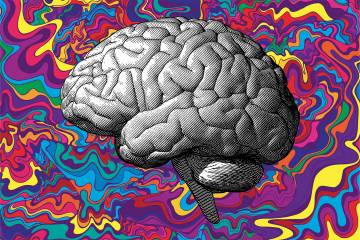Psilocybin—the substance that puts the magic in magic mushrooms—can help people emerge from depression, spur others to quit smoking, and even allow those facing terminal cancer to make peace with death.
The Food and Drug Administration and the Drug Enforcement Administration classified psilocybin as a "breakthrough therapy" for depression in 2018, a move many see as paving the way for the eventual approval of the drug as a treatment for mental health conditions. Patients are already clamoring for the treatment, which for many brings dramatic results in just a few sessions. The impending challenge? Training psychiatrists and other clinicians to administer psychedelics, which are significantly different from other classes of drugs prescribed for mental health.
A new $900,000 grant from the psychedelics-focused Heffter Research Institute will allow researchers from Johns Hopkins, Yale University, and New York University to build out a postdoctoral fellowship and gold-standard training program in psychedelic therapy. While some organizations have certification programs in psychedelics, they are often based on anecdotal observations, not hard data. "What is missing is an evidence-based approach," says Natalie Gukasyan, a Johns Hopkins assistant professor of psychiatry. Gukasyan, who is also medical director for the Johns Hopkins Center for Psychedelic & Consciousness Research, is leading Hopkins' efforts on the project.
At the forefront of psychedelic research
Since 2000, Johns Hopkins researchers have worked to understand the therapeutic potential of psychedelics
Humans have been experimenting with psychedelics for millennia, but the substances first caught the attention of scientists in the 1950s when American banker R. Gordon Wasson wrote in Life magazine about his experiences taking hallucinogenic mushrooms with an Indigenous Mexican healer named María Sabina. More than 1,000 studies on psychedelics were launched between the mid-1950s and the early 1970s, but the drugs' association with hippies and Harvard-psychologist-turned-counter-culture-icon Timothy Leary led to fear and condemnation. In 1970, President Richard Nixon signed the Comprehensive Drug Abuse Prevention and Control Act, which outlawed psilocybin, LSD, and other psychedelics and effectively ended research on the drugs for more than two decades.
In 1993, David Nichols, at the time a psychopharmacology professor at Purdue University, formed the Heffter Research Institute to support plans to reinitiate studies of psychedelics. And in 2000, Roland Griffiths, a Hopkins psychiatry and neuroscience professor received FDA approval to begin studying psilocybin at Hopkins. Over the decades that followed, Griffiths has created protocols for using the hallucinogenic drug in clinical settings and led dozens of studies showing the safety and efficacy of psilocybin. The Center for Psychedelic & Consciousness Research opened at Hopkins in 2019 with Griffiths at the helm. More than 40 researchers now work at the center on studies looking at the effects of psilocybin on anorexia, smoking, major depressive disease, Alzheimer's disease, and other conditions.
The Heffter grant will enable psychedelics experts to put together a one-to-two-year postdoctoral fellowship program for psychiatrists interested in using psilocybin and other psychedelics in their practice. Fellows will learn about screening and preparing patients for psychedelic therapy, dosing, creating the right setting and mindset for the treatment, and providing psychotherapy to those undergoing treatment with psychedelics. Additionally, researchers will put together an evidence-based curriculum that will encompass the latest research on psychedelic therapies, Gukasyan says. Each university will receive $300,000 over the next two years to fund the creation of the program.
Gukasyan is "cautiously optimistic" that the Food and Drug Administration and the Drug Enforcement Administration will approve psilocybin for clinical use in the next five years or so, but there is no guarantee. The program will also train psychiatrists in other clinical interventions involving unusual states of consciousness, including Holotropic Breathwork, a breathing technique that puts participants in an altered state of mind.
Assuming the federal government clears the way for psilocybin to be used by clinicians, the materials crafted by the teams from three universities will provide a guidepost for creating other fellowships and training programs, Gukasyan says. "There is a lot of interest in psychedelic therapy because not only is it effective quickly, but it is highly effective," she says. "People are excited about these early results. The best we can hope for is that [clinicians] will be able to have this tool in their toolbox."







